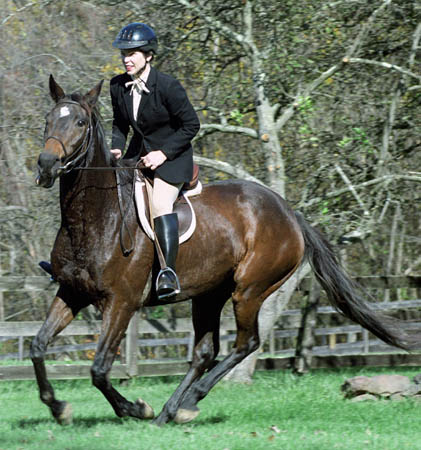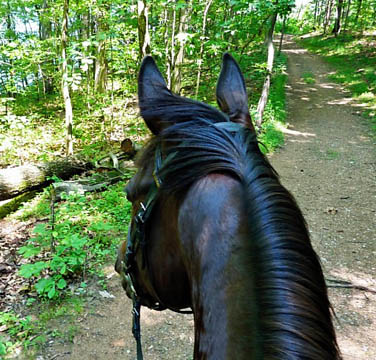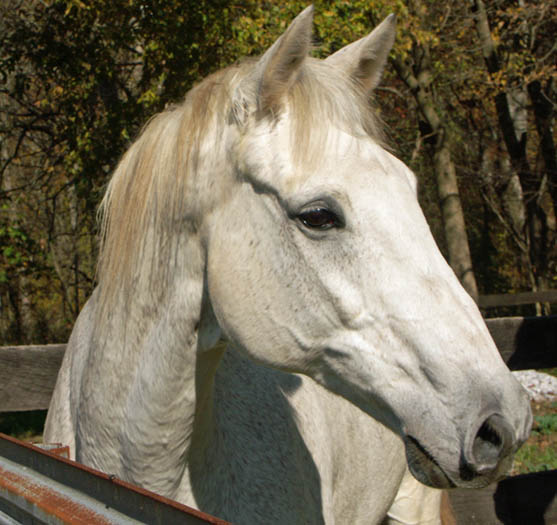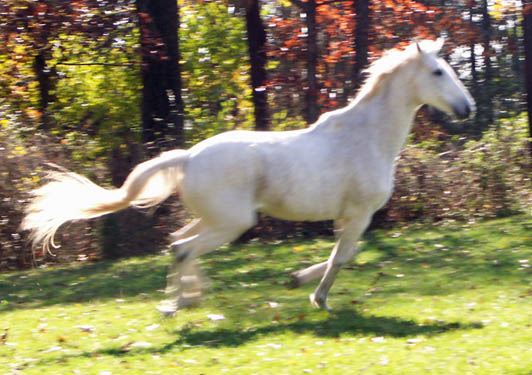So, You Think You Love Horses?
Some Reflections on the Nature of Horses and Man

My wife at a canter beginning to turn to the left.
Riding is all about balance not so much about strength.
Both horse and rider are relaxed and natural in their movements.
I never loved horses. Sure, they are magnificent animals, but risk life and limb to get on one? Forget it.
However, I married a horse crazy girl without knowing just what I was getting into. You know the kind of girl I am talking about. Unlike me, she never remembers not loving horses. She took riding lessons as a child, hung out at the stables, talked her parents into buying her a retired racehorse off the track (clearly they had no idea what they were doing), progressed in her ability to the point that she took ribbons in equitation at the state fair and tragically had to give up her horse when her father died. In her mind it was just a postponement, and she would be back in the saddle again as soon as possible.
Well, took 10 years and in 1975 we reached the point that I believed our income would support getting her a horse. It was just assumed that I would learn to ride also and I never considered that I could refuse to share in my wife's passion. I did not find it easy but in time I learned, and now I can sit on the back of a member of this species, called Equus caballus, without a moment's fear. I now enjoy horses and riding them. I enjoy caring for horses. I have taught others to ride horses, and I believe I understand horses. Here is some of what I learned.
The first thing to understand about horses is that they are not people with four legs. They experience the world differently from us. Their senses are much more acute than ours. They see differently and perhaps, in some ways better, they hear better, and they smell better. They are also capable of sensing ground vibrations in a way humans cannot. For example, my wife and I were in the woods several weeks before hunting season when both our horses suddenly stopped dead in the middle of the trail and stared intently at a clump of trees and brush maybe 100 yards off to the side of the trail. I could see nothing there, but after a minute a man in camouflage emerged to say he was looking for a good spot for hunting. I had no idea he was there, but the horses knew instantly. I wonder if two domestic horses so easily spotted him what chance he had with the deer. Just like people, horses have different personalities, changing moods and different aptitudes. They also seem to enjoy learning to do a task well and to have something similar to what we would call desires and ambitions in their own right.
A horse continually scans the environment.
|
| 
|
The next thing to understand about horses is that they are herbivorous (vegetarian) prey animals. They use their acute senses to spot danger and are continually analyzing their environment for clues to trouble. If horses were people we would say they had generalized anxiety disorder and panic attacks, but this is normal for them. We know that a domestic horse does not need to fear that a large predator will suddenly appear and eat them, but horses themselves are unconvinced. Nature has made them superb running machines, and their first instinct is to run away from danger. They weigh over 1000 pounds and if spooked might unintentionally knock a person down. A wise person working around horses decides what path a suddenly frightened horse might take and takes care not block the escape route. A wise person also does not suddenly approach a horse from its blind spot at its rear end. For the most part they do not wish to harm people and are not by nature aggressive, but individual ones, like individual dogs, may be an exception. Horses have a body language, and if you pay close attention to it you can tell if they are about to act up, misbehave, bite or kick. Have respect for their moods and do not force yourself upon them.
Horses are also herd animals. They know their own kind and wish to be part of a group. Within that group they have a role and a hierarchy. A group of domestic horses if given a chance will behave in a manner similar to a herd of wild horses. They will have a leader; some will enjoy higher status, and cliques will develop. Separation from the group often provokes anxiety. In many ways they are like high school teenagers. Not that I am saying there is anything wrong with behaving like teenagers. In both humans and horses this is normal behavior and serves the long term interests of the species. The rider must realize that he or she is intruding into the dynamic of the herd when a horse is removed from a group to work.
People make the mistake of believing that animals are stupid. My years spent with both humans and various other animals, particularly horses, have convinced me that this is absolutely not true. They are really quite clever. Most animal trainers or instructors will tell you that it is far easier to train the animal than it is to train the owner. Yes, relative to their size a horse's brain is smaller, but that is true of other herbivorous prey animals as well. Predators need more brain power to plan and carry out successful attacks on their prey. Human beings are omnivores. We can function both as carnivores and herbivores. The human brain uses up about 20 per cent of our total energy expenditure. That is a drain on any creature, and nature chooses to get by with a smaller, more fuel efficient brain in its herbivores. We had company one day who wanted a horseback ride. I removed a horse from the herd to give rides on. As we walked toward the group I noticed the horse was limping and apparently lame. I removed the halter from my lame horse only to have it suddenly run away sound as can be. Dumb animals do not play tricks on people. The horse accurately sized up the situation and carried out a successful plan to dodge having a bunch of amateurs on its back.
Animal behaviorists have done research into the ability of animals to have a concept of self and to generalize this notion onto others. To what degree can a horse know a person or understand that a human is a fellow being? To what degree can a horse love or have a relationship with a person? Domestic horses know humans from nearly the moment of birth. At worst, they tolerate us as a necessary provider of food and care and an unavoidable interruption in what would otherwise be a peaceful equine existence of eating grass in a field. Any horse person will assure you that horses are quite capable of being much more. They know themselves as individuals and will acknowledge a human being as an individual. If you call the name of one horse in a group, it will raise its head and the others will ignore you. When you approach a horse it will sniff you for a long time as if it is trying to identify you by your scent. You will see horses behave this way when greeting another horse or even checking out a pile of manure to see if it was left by any equine it knows. I suspect a horse can identify if another animal is a fellow grazing animal or a predator by its odor, and it is well aware that humans smell like a predator. I suspect that a horse would tell you that humans have this way of staring at a horse with all the intensity of a predator. It is difficult for them to fully trust these strange creatures that walk on only two legs and have such short necks. We need to understand this and work with them with infinite patience.

My horse looking at me.
Horses do relate to their riders
It is possible to bond with a horse. Some horses will look you in the eye and come to you while others seem to avoid your gaze and avoid you. It is said that George Armstrong Custer's horse was absolutely devoted to him and followed him around the cavalry post like a puppy dog. I notice that my horse watches me from the field through the widows while I do things in the house while my wife's horse does not. One day I was repairing a fence board with a portable drill and put the drill on the ground while driving a nail. My horse walked up behind me and grabbed the drill and ran away with it. This may have been his idea of a game, but also might reflect that he was jealous that I was paying attention to the fence and not to him.
If you truly care about the animal and take the time to develop a relationship, you will find he is capable of bonding with a human. Remember that he needs a leader if you sit on his back. Do not be afraid to correct him. When he was a young horse his mother corrected him. He will accept that as necessary. Remember also that to control a horse you must first control yourself. A horse absolutely knows if you are nervous, fearful or angry and will react. Such emotions are not the emotions of leadership and the horse understands that. The emotional rider is at risk of being rejected as a leader and perhaps even ejected as a rider as well. Horses are very intuitive and are attuned to the rider on their backs. They know by the feel (and I can tell as well just by looking for a second) if a rider knows what he or she is doing. I got an e-mail from a friend in which he told me of a tragic event in which an SUV ran into him and his horse while they were crossing a road. The rider fractured his leg and the horse fared even worse. The next time I was riding along a road I noticed that my horse flinched every time a vehicle passed by us. I was not aware that I was doing anything differently, and my horse certainly cannot read e-mails. Obviously, I must have been tensing ever so slightly, and he was picking up on it.

My horse running free.
Beauty in movement.
There is more to be said but I know that we humans in the end must learn lessons ourselves. There is no other human experience quite like running flat out or taking a fence on horseback and also having the confidence that your muscle memory developed from years of experience will keep you safe. Like most athletic pursuits a person is not born with the knowledge or experience of how to ride. There are some people who have a little more aptitude than others but mostly it takes time, training and practice with one step at a time. If you try you may not only discover horsemanship, but also learn a little about yourself along the way.
Yours truly,
The Accidental Horseman
MORE DISCUSSIONS ABOUT A WIDE RANGE OF HORSE RELATED TOPICS
Links



